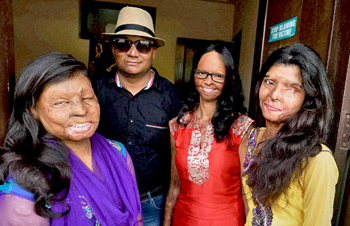New Delhi, Sep 8: After five acid attack victims -- all women came forward for a designerwear fashion photoshoot by him, photographer Rahul Saharan is now chronicling their moving life stories in a new documentary film.
 The in-the-works film portrays lives of the six people - all who survived brutal acid attacks and their attempts to get their lives back on the track.
The in-the-works film portrays lives of the six people - all who survived brutal acid attacks and their attempts to get their lives back on the track.
"It does not matter from whichever profession you come, you can always do something for society. I wanted to show how these victims have been fighting with their life, trying to recover, earn money and rehabilitate. I want to spread awareness among people with this film," Sharan told PTI.
Sharan has been associated with the campaign "Stop Acid Attack" and recently conducted a photoshoot with Laxmi, Rupa, Chanchal, Ritu and Sonam -- victims of acid attacks, who posed wearing clothes designed by Rupa.
"I wanted no makeup and editing in the pictures. I wanted them to look beautiful naturally. I tried to change the age long perception of beauty that is fed in the minds of the people," says Sharan.
Laxmi Saa along with Alok Dixit started the "Stop Acid Attack" campaign to regulate the free sale of acid in shops and to help rehabilitate victims.
"We have interviewed six victims for the film set to be around 30 minutes to 40 minutes. We want people to see how much they struggled and how they are overcoming their trials. We hope their stories would spread awareness among people," says Sharan.
The sole male voice in the upcoming film is provided by Chandrahass, who hails from Meerut and who says he was attacked with acid by his wealthy landlord.
The M.Com student, who left an insurance sector job to help his father manage the family shop, says he had a 5 litre bucket of acid thrown on him for reportedly coming to the defence of a girl who was being eveteased.
"The accused has contacts with politicians and that's how he is free. I have mortgaged my things, sold off gold to meet expenses of my treatment and also to hire an advocate after my landlord's son filed a case in which he alleged that I was the one who attacked him with acid," says Chandrahass.
Chandrahass recalls the day when he met with the attack.
"My whole body was burning. I crawled on the streets to save myself from a second bucket of acid. My hair started coming off. I could not see anything neither could I call anyone for help. Water doused on me had a reverse reaction on the burns," recalls Chandrahass.





Comments
Add new comment